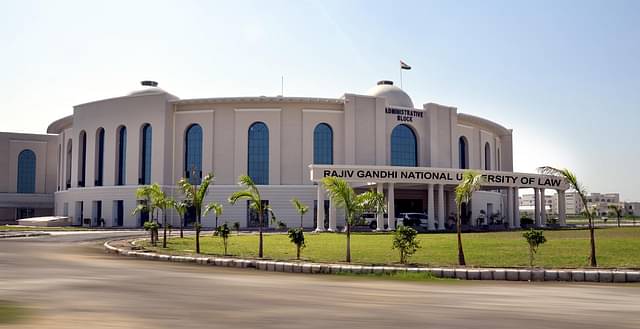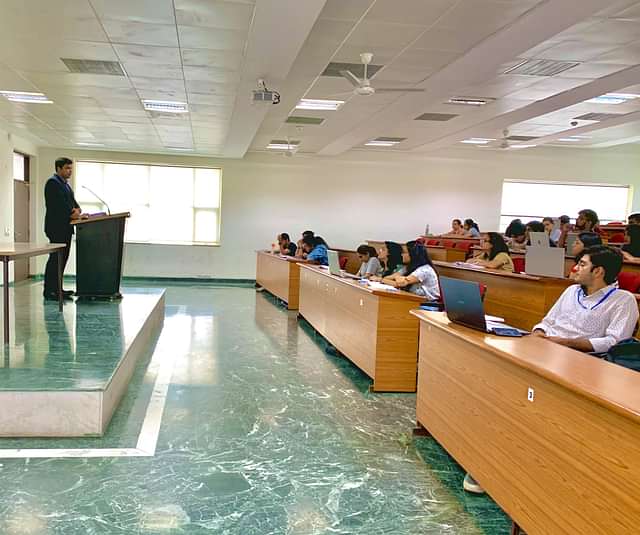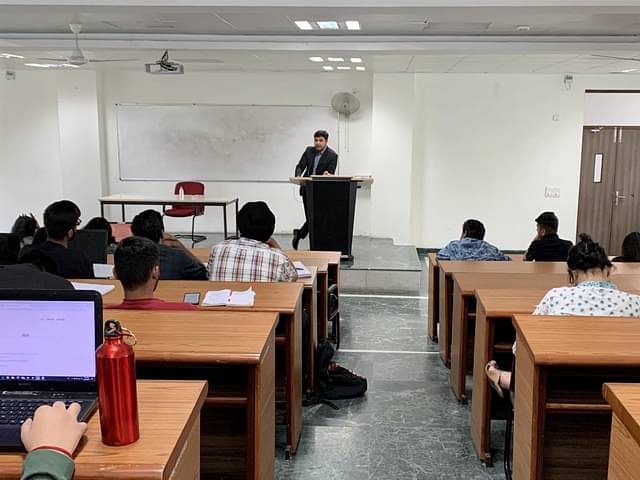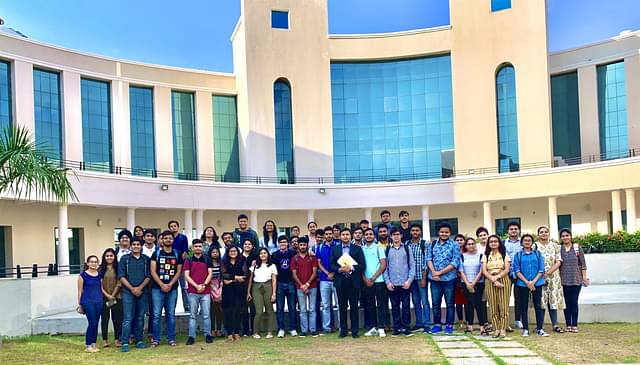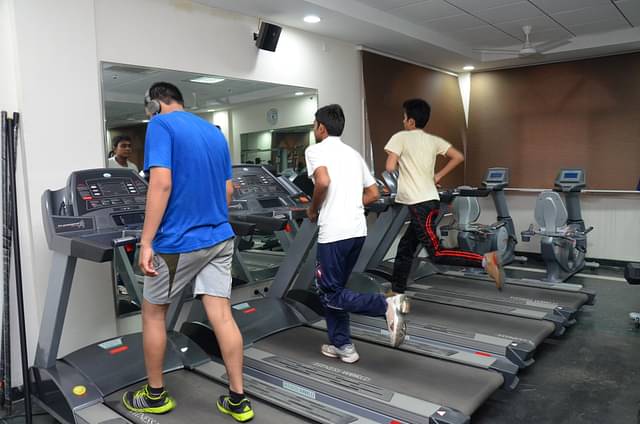RGNUL Latest Updates
The CLAT 2026 correction window has been activated and will remain available until November 9, 2025. The exam is set to take place on December 7, 2025, for admissions into UG and PG law courses.
The CLAT 2026 registration process will remain open until October 31, 2025, on consortiumofnlus.ac.in.for students applying to undergraduate and postgraduate law courses. The CLAT 2026 examination is set to take place on December 7, 2025.
About RGNUL
RGNUL, also known as Rajiv Gandhi National University of Law, was established in 2006 by the State Legislature of Punjab. The government of Punjab recognised the university as one of national stature and as a “centre of excellence in legal education in the modern era of globalisation and liberalisation”. RGNUL ranking by NIRF is 18th among the Top Universities of Law in India. It is approved by Bar Council of India (BCI), registered with University Grants Commission (UGC), and accredited by National Assessment and Accreditation Council (NAAC). The university offers courses in law at undergraduate and postgraduate levels. Popular RGNUL courses are BA LLB, LLM, and, PhD.
RGNUL Patiala campus is spread across 50 acres of land in Patiala and is equipped with amenities like a library, auditorium, sports complex, boys and girls hostels, health centre, etc. The university has also set up 17 centres of research and IGNOU School of Law is also functional at the university. RGNUL placement is done in reputed legal organisations like National Legal Service Authority of India, the Punjab Human Rights Commission, and so on.
Top Courses at RGNUL
| Course Name | Fees | Eligibility |
| Post Graduate Diploma | ₹9,000 | Bachelor's degree in any discipline, Minimum aggregate score of 50% or equivalent in undergraduate program |
| Ph.D. (Doctor of Philosophy) | ₹54,000 | Master's degree in Law with a minimum of 55% marks, Master's degree in Social Sciences, Humanities, or other relevant disciplines with a minimum of 55% marks |
| B.A. + LL.B. | ₹7,00,000 | 10+2 examination or equivalent, minimum aggregate score of 50%, General category age limit of 20 years, SC/ST category age limit of 22 years, CLAT score. |
| LL.M. (Master of Law) | ₹1,00,000 | Undergraduate degree in law (LL.B./B.A.LL.B./B.B.A.LL.B.), Minimum aggregate score of 55%, 5% relaxation for SC/ST categories, Qualification in Common Law Admission Test (CLAT) with a valid rank, Not completed LL.B. degree through distance education or correspondence mode |
Table of Contents
RGNUL Courses and Admission 2026
RGNUL courses are offered in the discipline of Law at the undergraduate and postgraduate levels. The popular courses include BA LLB and LLM. Below we enumerate all the courses offered at the university along with their fee details.
NLU Patiala Fees and Courses List
| Course | Fees | Duration | Seat Intake |
| BA LLB (Hons) | Rs 2,16,000 | 5 years | 180 |
| LLM | Rs 1,68,000 | 1 year | 60 |
| LLM Executive | Rs 1,25,000 | 1 year | 150 |
| PG Diploma in Prison Administration (PGDIPA) | Rs 9,000 | 1 year | 75 |
| PhD | Rs 20,000 | 3 years to 6 years | NA |
| Doctor of Law (LLD) | Rs 20,000 | 3 years to 5 years | NA |
RGNUL admission to the BA LLB (Hons) and LLM courses are made based on the scores of Common Law Admission Test (CLAT). CLAT exam is conducted by the Consortium of National Law Universities.
Below we mention the detailed RGNUL admission procedure:
- For the BA LLB (Hons) and LLM courses, aspiring students must register themselves for the Common Law Admission Test (CLAT) first and appear for the exam.
- To apply for the CLAT exam, students need to visit the official website of the Consortium of National Law Universities which is www.consortiumofnlus.ac.in.
- You will find a tab “Click Here for Registration” on this website.
- Click on this tab and the CLAT application form will open in a new window.
- As the next step for admission in the Rajiv Gandhi National University of Law, fill out the CLAT form with the correct and required details.
- Attach a passport-size photograph with your form and pay the application form fee.
- The application fee for the General category students is Rs 4,000 and for the SC/ST category students it is Rs 3,500.
- You can pay the application fee through debit card/credit card/net banking.
For admission in the PG Diploma in Prison Administration (PGDIPA) programme offered by the university, there is a separate RGNUL Patiala admission form available on the website. Candidates can access this form under the “Academic Programme” section of the official website of the university which is rgnul.ac.in. Apart from the application form for the PGDIPA course, there is also a separate link for paying the NLU Patiala admission fees. Students must note that this link is specifically applicable only for payment of the admission fee for the PGDIPA course at the university.
The Rajiv Gandhi National University of Law admission for the PhD course is based on the entrance test conducted by the university itself.
Aspiring students must visit the official website of the university which is rgnul.ac.in.
They must fill the PhD entrance test form available on the website and register themselves for the exam.
Once the RGNUL entrance exam will be conducted, it will be followed by an interview round.
The admissions process for the Doctor of Law (LLD) course at the university includes the presentation of the research proposal or the topic of research to the admission committee of the university. This may be followed by an interview.
The LLM Executive admission will be merit-based. Thus, for the RGNUL course admissions in this course, students must directly apply on the official website of the university.
They must fill in the application form with the accurate and required information and submit the form upon paying the admission fee. Students must also take out a print out of their application form for proof during the further rounds of selection process.
Below we mention the detailed list of documents required for RGNUL admission:
- Mark sheet of Class 10
- Certificate of Class 10
- Mark sheet of Class 12
- Certificate of Class 12
- Graduation degree
- Mark sheet of Graduation
- Postgraduate certificate
- Postgraduate degree
- Character certificate
- Transfer certificate
- Migration certificate
- Caste certificate (if belonging to reserved categories)
- Detailed mark sheets of LLM or Postgraduation course (for PhD admission)
- Research Proposal (for PhD admission)
RGNUL Highlights
RGNUL Placements
RGNUL placements are carried out by the placement cell of the university. The placement cell has a systematic process in place for carrying out the placement drive at the NLU Patiala. Below we mention the various stages of placement followed by the university:
Step 1: Communication
Communication or establishment of relations is the first step followed by the cell for the RGNUL placements. During this stage, the placement cell sends invitations for the placement drive to the prospective recruiters. These invitations contain details like date, time, and placement brochure.
Step 2: Orientation
This stage comprises of pre-placement talks. The talks convey details about the job offers, work culture, RGNUL placements salary, and other rules and regulations of employment. The placement cell urges the recruiters to deliver the pre-placement talk if they agree to do so.
Step 3: Shortlisting
This includes the pre-interview screening round, streamlining of prospective students, and, the final interview. The selection process may include various stages as decided by the recruiters. This could involve group discussions, aptitude tests, written tests, personality evaluation rounds, or questionnaires.
Step 4: Intimation
At this step of the Rajiv Gandhi National University of Law placement, the recruiters communicate the selection status of students to the placement cell of the university. This is essentially the stage of the formalities.
Step 5: Finalisation
At this stage, the final selection of candidates is done by the recruiters. They shortlist the students and transfer the job offers containing the RGNUL placement packages to the placement cell. The cell then communicates the same to the students.
RGNUL Placement Stats 2023

RGNUL Reviews
RGNUL FAQs
Who are the top recruiters for RGNUL placement?
Is there any Rajiv Gandhi National University of Law entrance exam?
What is the Rajiv Gandhi National University of Law contact number?
What is the RGNUL address?
What are the Rajiv Gandhi National University of Law ranking?
Is RGNUL Patiala recognised by the UGC?
Is RGNUL Patiala a government college?
What is the year of establishment of RGNLU Patiala ?
RGNUL NIRF Rankings 2024
- The Rajiv Gandhi National University of Law is ranked 18th among the Top Universities of Law in India by the NIRF 2022 ranking.
- Ranked 10th by the National Institutional Ranking Framework (NIRF) in the Law Schools category in 2021.
- Ranked 10th by the NIRF 2019 in the Law Schools category in India.
- The Rajiv Gandhi National University of Law ranking by The Week in 2019 was 13th among the Law Schools category.
- It is approved by the Bar Council of India (BCI).
- The university is registered under University Grants Commission (UGC).
- Accredited by the National Assessment and Accreditation Council (NAAC).
- RGNUL Patiala is a member of the Association of Indian Universities (AIU).
Ranking Publisher NIRF
- Law#24
RGNUL Law NIRF Ranking 2025
- OVERALLCombined scores base on institute performance.54.7GOOD
- TLRStrong emphasis on quality education and adequate resources.65.6GOOD
- RPActive engagement in research, high-quality publications, and strong professional collaborations.24AVERAGE
- GOGood placement and higher study opportunities for students, high median salary, and admissions into top universities.56.44GOOD
- OIFocus on diversity, inclusivity, and facilities for disadvantaged and physically challenged students.73.24GOOD
- PRPositive perception among employers, research investors, and academic peers.34.34AVERAGE
RGNUL Campus Facilities and Infrastructure
The Rajiv Gandhi National University of Law campus is spread across 50 acres of land. It is located in Sihuwal, Patiala, Punjab. Below we explain the various amenities provided by the university for its students.
Rajiv Gandhi National University of Law Hostel Facilities: The university has eleven hostel blocks (6 for boys and 5 for girls) which have been renovated recently. All these blocks are equipped with separate mess/dining facilities. The total covered area by these hostels is 3,34,978 sq feet. All the hostels, as well as the attached mess, are made fully air-conditioned. Each hostel is equipped with one aqua guard with a water cooler to ensure a supply of purified drinkable water for twenty-four hours. Proper hygiene and sanitation facilities are maintained in all the hostels of the campus and housekeeping services are available all day and night. The staff for the same is available twenty-four seven at the campus.
RGNUL Computer Lab facilities: The university has highly advanced computer labs and other IT rooms. This includes a server room, a well-equipped computer room with 70 systems, an educational IT equipment room, and so on.
Rajiv Gandhi National University of Law Medical Facilities: The university health centre has complete facilities for indoor admissions, minor surgeries, resuscitation equipment, vaccinations, sterilization of equipment and a stock of medicines for routine and emergency ailments. It functions for twenty-four hours.
RGNUL Patiala Gym Facilities: The gym is well equipped with cardio machines like treadmills, cross trainers, spin bikes, etc., and also has machines for weight training. Occasionally other health-related activities like yoga, aerobics and the like are also performed.
Rajiv Gandhi National University of Law Sports Facilities: There are huge sports grounds for tennis, football, basketball, etc.
Campus Facilities
RGNUL Faculty
RGNUL Alumni
| Name of alumnus |
|---|
| Alumnus 1 |
| Alumnus 2 |
| Alumnus 3 |
RGNUL Scholarships
The university aims to make quality education in the field of law accessible to all. It offers various scholarships and financial aid to students who belong to a financially weak background. These scholarships are awarded on a merit basis as well as a need basis. Students can avail of these scholarships by filling out the RGNUL scholarship form and submitting it to the Established Superintendent within one month from the date of their admission so that the same can be sent to the concerned Departments for grant of scholarships.
- Under the Central Sector Scholarship Scheme of Top Class Education for Scheduled Caste (SC) students, five scholarships have been allotted to the university by the Ministry of Social Justice and Empowerment, Government of India.
- The Rajiv Gandhi National University of Law may give a maximum concession of up to 50% of the tuition fee to the deserving students of each class. The committee may select 2 students from each class for the same.
- Under the Central Sector Scholarship Scheme of Top Class Education for Scheduled Tribe (ST) students, two scholarships are awarded to the university by the Ministry of Tribal Affairs, Government of India.
Interested students must check for their eligibility and complete the formalities for the Rajiv Gandhi National University of Law scholarship process.
RGNUL Scholarship Statistics
| Gender | Male | Female |
|---|---|---|
| Total | 3 | 2 |
| OBC | 0 | 0 |
| SC | 3 | 2 |
| ST | 0 | 0 |
| Muslim | 0 | 0 |
| PWD | 0 | 0 |
| Minority Community | 0 | 0 |
RGNUL Contact Details
College Location
Sidhuwal - Bhadson Road, Patiala (PUNJAB)
info@rgnul.ac.in
+91-1752391600
https://rgnul.ac.in
Related Questions
Dear Student,
The percentage required in class 12th for B.Com LLB course is minimum 50% for general category students and minimum 45% for reserved category students in any stream. Moreover, candidates also need to ensure that they have completed their class 12th from a recognized board of school education. The application fees for B.Com LLB course varies from colleges to universities, and yes relaxation is given with respect to registration fees to SC candidates. The application fee ranges between INR 350 - 500 for SC students and is to be paid online only while filling the application form for B.Com LLB course. The BCom LLB application fees in government colleges are much less than in private colleges.
Dear student, Rajiv Gandhi National University of Law Patiala does not offer any Law Diploma programmes. Given below is the list of some popular Law Diploma programmes -
-
Diploma in Cyber Law
-
Diploma in Taxation Law
-
Diploma in Labour Laws and Labour Welfare
-
Diploma in Labour Law
-
Diploma in Criminology
You can apply for admission in these diploma courses in other reputed Law institutions through our Common Application Form directly. There are several institutions situated all across the country which offers these Diploma courses in Law that can be found by clicking on the application form link given above. Want to find out more about the admission process? Call us now @18005729877 and speak to our academic counsellors regarding the same.
Dear Anjali,
The Rajiv Gandhi National University of Law offers admission based on merit in the Common Law Admission Test (CLAT). The total number of seats available for the B.A.LL.B.(Hons.) Five Years Integrated Course is 180. To qualify for admission you must have qualified class 12 from PSEB or equivalent with 45 per cent marks. As you have secured 92 per cent marks in CBSE, you are undoubtedly eligible for admission. However, you must have CLAT scores as this is the prerequisite for admission during the counselling process.
Hope this helps!
Feel free to contact us for any further queries or questions.
Admission Updates for 2026
Similar Colleges
Explore More Law Colleges in Punjab
- Colleges in Patiala
- RGNUL

.JPG?width=1080)
